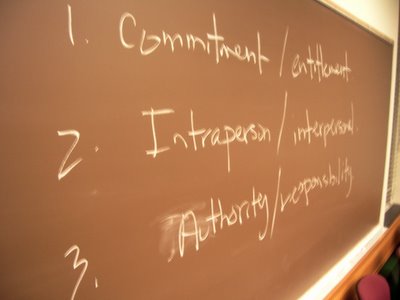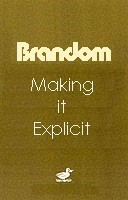Making It Explicit, Chapter 3, Parts III & IV
Last night the workshop met to discuss the last two sections of chapter 3 in Making It Explicit.
Thanks again to Russell for taking me to get the provisions for the workshop.
Part I (Pictured: three dimensions of assertional significance)
(Pictured: three dimensions of assertional significance)
David F. gave the introduction tonight. His raised a number of different questions for consideration.
1. He began by drawing our attention to the central role that Brandom thinks assertion plays in the "game of giving and asking for reasons". Assertions, unlike actions and perceptions (reliable acquisitions of assertional commitments (RAAC)), can both stand in need of and be offered as reasons. Actions cannot (according to Brandom) serve as reasons (p.171), and perceptions (or RAACs) cannot stand in need of reasons. Later in the workshop, Jason asked whether this gloss on what assertion is amounted to a definition of assertion. It seems far too sketchy to count as a definition, since one might reasonably think (for example) that actions can be offered as reasons for assertions or further actions, as well as standing in need of reasons. (A secret handshake, for example, might be a reason for letting you-know-who into you-know-what.) To say that actions don't amount to assertional reasons is obviously to beg the question.
2. David said that there are three ways for a subject to be entitled to an assertion: (i) he can give a reason for p; (ii) he can defer to a person who asserted p; (iii) he can be entitled to p on the basis of perception. (This picture of entitlement was also called into question later in the workshop, because it looks like Brandom is committed to the idea that one can be entitled to assert p if no one challenges the assertion. More on that later.) David pointed out that many philosophers think that if the only ways that subjects were entitled to assert p were (i) and (ii) (which correspond to inference and testimony, respectively), there would be a vicious regress of entitlement. Sellars, for example, thinks we need perception to entitle (justify) us to assert p in order to halt the regress. But, interestingly, it looks like Brandom isn't too concerned with this kind of traditional worry about a regress of entitlement. On p. 177 Brandom says that "the worry about a regress of entitlements is recognizably foundationalist", and that he responds to the worry by introducing the idea that "if many claims are treated as innocent until proven guilty...the global threat of regress dissolves". Jason raised a worry about this purported dissolution of the regress by asking how a simple fact about the structure of the game of giving and asking for reasons was supposed to alleviate any worries about justification. (Though, to be fair to Brandom, the fact about the game of giving and asking for reasons is supposed to be constitutive of entitlement. But, to be fair to Jason, this just raises the question we kept asking last week: how are norms (like genuine entitlement) supposed to arise out of mere practices? We still haven't got an account of that yet, and without one, Jason's question is a serious challenge.)
3. David asked whether Brandom's view of interpersonal, intracontent scorekeeping consequences didn't involve a blurring of the difference between how we entitle addressees of an assertion to themselves assert p and how we entitle (if we do at all) mere overhearers of what we assert (see the last full paragraph on p. 186). Ben, our resident expert on all things testimonial, pretty much agreed (with some reminders about how there are more and less inclusive notions of address).
4. David next gave a quick rundown of the deontic scorekeeping project. Someone asked how many scoreboards there would have to be for such a project to work. David said that each participant would have a scoreboard, on which he would keep tabs of the scores of everyone else in the practice (presumably including a row or column, or whatever, for himself). "The force of an utterance, the significance of a speech act, is to be understood in terms of the difference it makes to what commitments and entitlements are attributed and undertaken by various interlocutors" (p. 188). David asked whether Brandom should have said ought where are is in the quote just given. Shouldn't it be the case that what significance and force an utterance of mine has depends on what effects my utterance should have, and not on those effects it happens to have? It looked like this was another place where what should be normative statuses of various kinds are being constituted by brute regularist patterns of activity.
5. After Brandom explains David Lewis's "Scorekeeping in a Language Game", he goes on to say how his appropriation of the idea of scorekeeping differs from Lewis's. Brandom says: "...the notion of linguistic scorekeeping is intended to play a more fundamental explanatory role here than Lewis has in mind for it. For he is happy to think of conversational scores as kept track of in 'mental scoreboards', consisting of attitudes he calls 'mental representations' of the score (representations, presumably, whose content is that some component of the score is currently such and such). Clearly he does not envisage a project such as the present one, in which both the nature of mental states such as belief and their representational contents are themselves to be understood in terms of their role in scorekeeping practices, rather than the other way around". Now thinking about this comment caused some consternation in the workshop, because it isn't at all clear how we are to understand how we keep score on one another without assuming some role for content. Is it supposed to be obvious what it means to "keep track" of one another's scores, attributing entitlements and commitments, without using anything like a (content-involving) that-clause?
Part II
The floor was now open for general discussion (some of which I have already penciled in, above).
1. I added to David's list of concerns by raising a worry about holism. The significance of a speech act is determined by the difference it makes to the commitments and entitlements attributed and undertaken by participants in the practice (p. 188). So, it seems, the significance of an assertion I make depends on the vagaries of those around me--how they respond, what kind of entitlement they attribute to me, and so on. How, then, can two subjects make an assertion that has the same significance? It seems overwhelmingly likely that the overall difference your assertion of p makes to the sum total of commitments and entitlements attributed and undertaken by the participants in the practice will be different than the overall difference my assertion of p makes. And there will be similar problems about how I can count as making the same assertion at two different times. David responded by saying that the holist shouldn't accept the idea that any difference of commitment or entitlement anywhere in the whole makes for a difference of significance. The holist should claim that while significance depends on, or is a function of, the whole range of commitments and entitlements undertaken and attributed, appropriately adjusted differences can correspond to the same overall significance. For example, you and I may have received different scores on every quiz taken over the course of the semester, but still end up with the same grade. So while our overall grades depend on how we do on each quiz, that doesn't mean that lower-level differences amount to a difference in significance. Jason asked whether the situation would be any different with numerical grades (the answer, I think, was: not really).
2. Ben then asked how we should understand Brandom's claim that "...issuing an asssertional performance can warrant further commitments, whether by the asserter or by the audience, only if that warranting commitment itself is one the asserter is entitled to" (p.171). Ben thought that it was odd to talk about warranting or authorizing my commitment to q by my assertion that p. He cited Brandom's earlier "Asserting" paper, saying that Brandom thinks of asserting p as just the issuing of an inference license. It struck Ben (and others) as incorrect to say that by asserting p, you thereby license or authorize yourself to be committed to q (so long as you're entitled to p). I think (though I could be wrong) that there were two different reasons offered to explain this feeling of incorrectness: (i) talk of "licensing" or "authorizing" oneself to believe q on the basis of one's asserting p looks like one is licensing one's transition from p to q on the basis of giving oneself testimony, which looks like a distortion of the epistemic relations among one's commitments and entitlements (we don't have to take our own word for p in order to be authorized to assert q); (ii) more generally, it looks awkward to say that it is the social attitudes of acknowledging commitments and attributing entitlements that constitute epistemic entitlement, for reasons discussed above (in short: how do you precipitate the norms out of the social attitudes?).
Jason offered an analogy to elucidate Brandom's picture of asserting p (so long as one is entitled to do so) as authorizing one to assert q: imagine you are volunteering to go on a dangerous quest (you assert p). Volunteering entitles you to sit at the head of the table (you're authorized to assert q). The appropriate question at this point was: to what extent is it appropriate to understand asserting on this "quest-dinner table" model? (The answer mooted was "not very".)
(At this point I should register the fact that I didn't completely follow the discussion of assertion and authorization--the account given in the last two paragraphs is the best reconstruction I could manage.)
Part III
The workshop wound down with some worries about the overall project in Making It Explicit. Jason pointed out that Brandom says in the preface that "Chapters 3 and 4 present the core theory--the model according to which a pragmatics specifying the social practices in which conceptual norms are implicit and a broadly inferential semantics are combined. It is here that sufficient conditions are put forward for the practices a community is interpreted as engaging in to count as according performances the pragmatic significance characteristic of assertions--and hence for those practices to count as conferring specifically propositional contents" (p. xxii). This claim was worrying, because, as far as we can tell, the only attempt to give "sufficient conditions" for assertions consists of Brandom's remarks about how assertions differ from perceptual reports and actions in that assertions can both serve as and demand justification by reasons. And that seems a pretty meager defense of this core part of the theory. And the worries that have been around since chapter one about what "norms implicit in practice" really amount to, if they aren't full-blooded rules, and also aren't just social regularities, have not been assuaged. As far as we can tell, Brandom hasn't really said how he avoids both of those positions he regards as unacceptable. Again, maybe we've just missed it.
Browse previous summaries of Making It Explicit here, here, here, and here.



